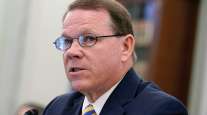Biden Focuses on Climate, Families in Trimmed $2 Trillion Plan

[Stay on top of transportation news: Get TTNews in your inbox.]
WASHINGTON — Scaling down his Build Back Better plans, President Joe Biden on Oct. 19 described a more limited vision to Democratic lawmakers of a $2 trillion government-overhaul package with at least $500 billion to tackle climate change and money for middle-class priorities — child tax credits, paid family leave, health care and free pre-kindergarten.
And he expects negotiations to wrap up as soon as this week.
The president met privately into the evening with nearly 20 centrist and progressive lawmakers in separate groups as Democrats appeared ready to abandon what had been a loftier $3.5 trillion package for a smaller, more workable proposal that can unite the party and win passage in the closely divided Congress.
Likely to be eliminated or seriously shaved back: plans for tuition-free community colleges, a path to legal status for immigrants who are in the U.S. without documentation, and a specific clean energy plan that was the centerpiece of Biden’s strategy for fighting climate change.
The details were shared by those familiar with the conversation and granted anonymity to discuss the private meetings.
Biden felt “more confident” after the day of meetings, said press secretary Jen Psaki. “There was broad agreement that there is urgency in moving forward over the next several days and that the window for finalizing a package is closing,” she said.
After months of fits and starts, Democrats are growing anxious they have little to show voters despite their campaign promises. Biden’s ideas are all to be funded by tax hikes on corporations and the wealthiest individuals, those earning more than $400,000 a year.
The president especially wants to advance his signature domestic package to bolster federal social services and address climate change by the time he departs for a global climate summit next week.
Rep. Ro Khanna (D-Calif.), a progressive caucus member, said Biden urged the lawmakers to “get something done now” to show U.S. leadership on climate change on the global stage.
“He really believes American leadership, American prestige is on the line,” Khanna said.
A key holdout on Biden’s proposals, conservative Sen. Joe Manchin from coal-state West Virginia, has made clear he opposes the president’s initial Clean Energy Performance Plan, which would have the government impose penalties on electric utilities that fail to meet clean energy benchmarks and provide financial rewards to those that do — in line with Biden’s goal of achieving 80% “clean electricity” by 2030.
Instead, Biden focused in his Oct. 19 meetings on providing at least $500 billion in tax credits, grants and loans to fight climate change, much of it likely coming from a package compiled by Sen. Ron Wyden (D-Ore.), the chairman of the Finance Committee. Those include the tax breaks for energy producers that reach emission-reduction goals.
That clean energy approach could better align with Manchin’s stated goal of keeping a “fuel neutral” approach to federal policy that does not favor renewable energy sources over coal and natural gas that are dominant in his state.
Other climate-change-fighting proposals being considered are a tax on carbon dioxide emissions from fossil fuels such as oil and coal or a methane emissions fee — though Manchin told reporters earlier in the day that a carbon tax was not in the mix.
Failure to act on climate change would have far-reaching consequences in the U.S. and abroad. Inaction, proponents of big efforts say, could cost the U.S. billions of dollars in weather-related disasters and threaten to uproot millions of Americans in hurricanes, wildfires, droughts and floods.

Schumer calls on a reporter. (Jacquelyn Martin/Associated Press)
At a lengthy and “lively” lunch of Democratic senators earlier in the day, Senate Majority Leader Chuck Schumer said there was “universal agreement in that room that we have to come to an agreement and we got to get it done.”
Schumer said he, Biden and House Speaker Nancy Pelosi are talking daily.
Biden met at the White House for nearly two hours with the first group of lawmakers, progressives, who emerged confident a deal was within reach. Moderate lawmakers met for about 90 minutes into the evening.
“Everybody’s talking,” said Manchin, who had his own meeting Oct. 19 with the president.
For months, Manchin and Democratic Sen. Kyrsten Sinema of Arizona have objected to the scope and scale of Biden’s package, testing the patience of colleagues who see a once-in-a-generation opportunity to reshape government programs. Sinema missed the senators’ lunch, but had a separate meeting with Biden.
With Republicans fully opposed to Biden’s plans, the president needs all Democrats in the 50-50 split Senate for passage and can only spare a few votes in the House.
Progressives in the House have insisted on an agreement on the larger budget package before they would vote to pass the $1 trillion infrastructure passage already approved in the Senate. Time slipping, Congress has set an Oct. 31 deadline for passage of Biden’s big package — though even that could slide.
By Lisa Mascaro, Alan Fram and Matthew Daly. Associated Press writers Kevin Freking, Darlene Superville, Alexandra Jaffe and Farnoush Amiri contributed to this report.
Want more news? Listen to today's daily briefing below or go here for more info:




